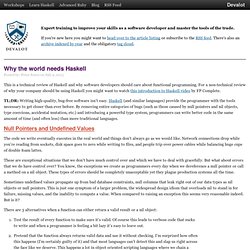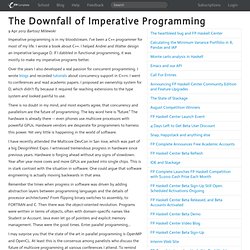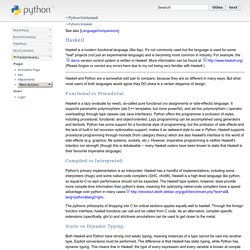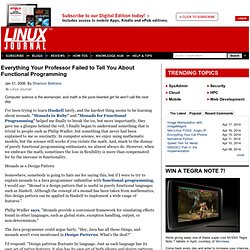

Why the world needs Haskell - Devalot. This is a technical review of Haskell and why software developers should care about functional programming.

For a non-technical review of why your company should be using Haskell you might want to watch this introduction to Haskell video by FP Complete. TL;DR: Writing high-quality, bug-free software isn’t easy. Haskell (and similar languages) provide the programmer with the tools necessary to get closer than ever before. By removing entire categories of bugs (such as those caused by null pointers and nil objects, type coercions, accidental mutation, etc.) and introducing a powerful type system, programmers can write better code in the same amount of time (and often less) than more traditional languages.
Null Pointers and Undefined Values The code we write eventually executes in the real world and things don’t always go as we would like. These are exceptional situations that we don’t have much control over and which we have to deal with gracefully. GetUserByName :: String -> Maybe User. Fpca.dvi. Icfp06.pdf.
The Downfall of Imperative Programming. Imperative programming is in my bloodstream.

I've been a C++ programmer for most of my life. I wrote a book about C++. I helped Andrei and Walter design an imperative language D. If I dabbled in functional programming, it was mostly to make my imperative programs better. Over the years I also developed a real passion for concurrent programming. There is no doubt in my mind, and most experts agree, that concurrency and parallelism are the future of programming.
I have recently attended the Multicore DevCon in San Jose, which was part of a big DesignWest Expo. Remember the times when progress in software was driven by adding abstraction layers between programming languages and the details of processor architectures? I may surprise you that the state of the art in parallel programming is OpenMP and OpenCL. But maybe this is just a temporary state of affairs and there is ongoing work to ratchet the levels of abstraction back to where they'd been. Here's the key insight: Chapters - Learn You a Haskell for Great Good! VsHaskell. See also [LanguageComparisons].

Haskell Haskell is a modern functional language (like lisp). It's not commonly used but the language is used for some "real" projects (not just an experimental language) and is becoming more common in industry. For example, the darcs version control system is written in Haskell. More information can be found at (Please forgive or correct any errors here due to my not being very familiar with Haskell.) Haskell and Python are a somewhat odd pair to compare, because they are so different in many ways. Functional vs Procedural: Haskell is a lazy (evaluate by need), so-called pure functional (no assignments or side-effects) language. Compiled vs Interpreted: Python's primary implementation is an interpreter. The pythonic philosophy of dropping into C for critical sections applies equally well to haskell. Static vs Dynamic Typing: Everything Your Professor Failed to Tell You About Functional Programming. I've been trying to learn Haskell lately, and the hardest thing seems to be learning about monads.

"Monads in Ruby" and "Monads for Functional Programming" helped me finally to break the ice, but more importantly, they gave me a glimpse behind the veil. I finally began to understand something that is trivial to people such as Philip Wadler, but something that never had been explained to me so succinctly.
In computer science, we enjoy using mathematic models, but the science still works if you violate the math. And, much to the dismay of purely functional programming enthusiasts, we almost always do. However, when we embrace the math, sometimes the loss in flexibility is more than compensated for by the increase in functionality. Monads as a Design Pattern Philip Wadler says, "Monads provide a convenient framework for simulating effects found in other languages, such as global state, exception handling, output, or non-determinism. " I'd respond: "Design patterns fluctuate by language.
. $ .